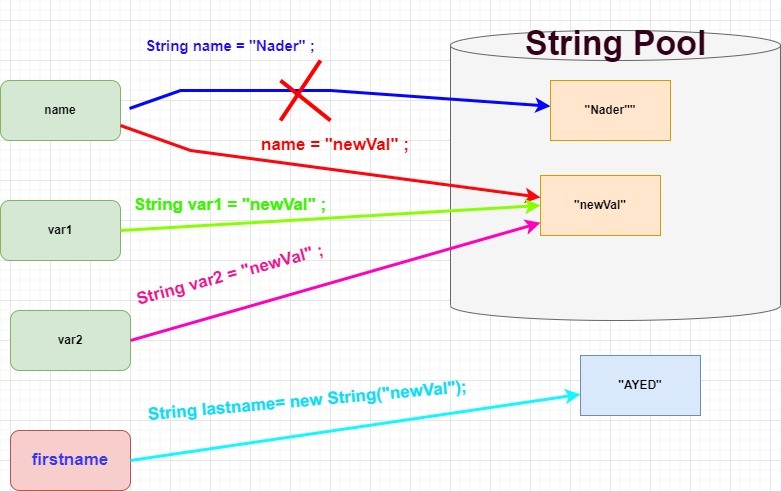Exploring the Benefits of Unalterable Strings in Modern Programming Paradigms
In the realm of contemporary shows standards, the concept of unalterable strings stands as a foundation of robust software application development. By embracing immutable strings, programmers can make certain boosted data honesty, improved string security, streamlined debugging processes, boosted safety and security procedures, and reliable efficiency optimization.
Improved Information Stability

By preventing the modification of string items, immutability removes the risk of unintended adjustments to the information they hold. This not only improves the security of the info but additionally boosts the dependability of the code that depends on these strings.
Immutability also supports safer multithreading atmospheres, as concurrent accessibility to unalterable strings does not position the danger of data corruption with synchronised adjustments. This property streamlines the procedure of dealing with strings in parallel programs scenarios.
Basically, immutability serves as a safety guard around the data saved within strings, improving their honesty by guaranteeing that once defined, their values remain the same throughout the program's implementation.

Enhanced Thread Safety
Unalterable strings boost the string security of programs by making certain that as soon as a string things is produced, its worth can not be changed. This property removes the threat of simultaneous strings attempting to customize the very same string concurrently, which can cause information corruption or inconsistent states in the program - Why are strings immutable in Java?. In a multi-threaded environment, where multiple threads accessibility and manipulate information concurrently, the immutability of strings provides a degree of safety and security by ensuring that the data stays unmodified throughout its lifecycle
Streamlined Debugging Procedures
Provided the boosted thread security facilitated by immutable strings, a significant advantage develops in the realm of streamlined debugging procedures. Unalterable strings, as soon as produced, can not be altered, making it much easier to trace the flow of data and identify the source of bugs in a program. This immutability makes sure that strings continue to be consistent throughout the implementation of the program, decreasing the possibility of unforeseen modifications that could lead to mistakes.
When debugging with mutable strings, designers frequently come across issues where a string's value is modified unintentionally, making it challenging to pinpoint the origin of a pest. Nonetheless, with unalterable strings, the information continues to be unmodified, permitting developers to concentrate on evaluating the real reasoning of the code instead than locating where and when a string was changed improperly.
Furthermore, unalterable strings simplify the debugging procedure by allowing easier reproduction of bugs. Because unalterable strings do not alter state, programmers can recreate and study pests a lot more properly, resulting in quicker identification and resolution of problems within the codebase. This streamlined debugging workflow ultimately contributes to higher software program top quality and improved general advancement efficiency.

Increased Security Procedures
Enhancing data defense and strengthening system honesty, the use of unalterable view website strings in software application applications adds dramatically to raised safety and security procedures. Unalterable strings likewise play a vital duty in preventing common safety susceptabilities such as barrier overflows and SQL injection strikes, as efforts to manipulate string data at runtime are naturally limited.
Additionally, the immutability of strings enhances the predictability of program behavior, making it much easier to verify inputs and protect against unexpected modifications that can endanger safety and security. This predictability simplifies the procedure of bookkeeping and confirming code, making it possible for programmers to determine possible security technicalities better. On the whole, incorporating immutable strings into software application development techniques not just boosts the effectiveness and integrity of applications but also enhances their resilience versus safety dangers.
Reliable Efficiency Optimization
Building upon the foundation of increased safety steps accomplished with the utilization of immutable strings, a vital element to take into consideration in software application advancement is reliable performance optimization. When handling mutable strings, operations like concatenation or substring creation frequently result in the development of new string things, resulting in memory expenses and boosted handling time. Nonetheless, with immutable strings, these operations can be optimized to boost efficiency. By allowing strings to stay stable and consistent, immutable strings help with far better memory monitoring and caching opportunities, eventually enhancing the total performance of the software.
Unalterable strings likewise play an essential role in multithreaded settings by advertising string security. Why are strings immutable in Java?. Because unalterable strings can not be customized once created, they can be shared throughout threads without the danger of unforeseen changes, minimizing the requirement for synchronization devices and boosting concurrency. Additionally, unalterable strings simplify debugging procedures as programmers can trust that a string's worth will remain regular throughout the program's execution, eliminating potential errors triggered by mutable state changes. In verdict, the usage of unalterable strings not just enhances safety but likewise considerably adds to the reliable performance optimization of modern-day software program systems.
Conclusion
Finally, look at here the advantages of using immutable strings in modern programming standards can not be overstated. Enhanced data honesty, boosted string security, simplified debugging procedures, boosted YOURURL.com safety measures, and effective efficiency optimization all add to the overall effectiveness of programming tasks. By incorporating unalterable strings right into shows practices, programmers can benefit from an extra robust and reliable codebase.
Immutability, a key feature of strings in shows languages such as Java and Python, makes certain that once a string object is created, it can not be changed or customized.Unalterable strings boost the thread safety and security of programs by making sure that once a string things is created, its value can not be changed. Unalterable strings likewise play an essential duty in stopping usual safety vulnerabilities such as barrier overflows and SQL injection attacks, as efforts to manipulate string information at runtime are naturally limited.
By enabling strings to remain constant and stable, unalterable strings facilitate far better memory monitoring and caching chances, inevitably increasing the overall effectiveness of the software.
Unalterable strings streamline debugging processes as designers can rely on that a string's worth will remain regular throughout the program's execution, eliminating potential errors caused by mutable state adjustments.
Comments on “Why Are Strings Immutable in Java? Best Practices and Use Situations”